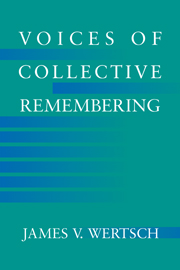Book contents
- Frontmatter
- Contents
- Introduction and Acknowledgments
- 1 An Encounter with Collective Memory
- 2 Methodological Preliminaries to the Study of Collective Remembering
- 3 Collective Memory: A Term in Search of a Meaning
- 4 State Production of Official Historical Narratives
- 5 Narrative Dialogicality and Narrative Templates in the Production of Official Collective Memory
- 6 The Consumption of Historical Narratives
- 7 Generational Differences in Collective Remembering
- Conclusion
- References
- Index
1 - An Encounter with Collective Memory
Published online by Cambridge University Press: 08 January 2010
- Frontmatter
- Contents
- Introduction and Acknowledgments
- 1 An Encounter with Collective Memory
- 2 Methodological Preliminaries to the Study of Collective Remembering
- 3 Collective Memory: A Term in Search of a Meaning
- 4 State Production of Official Historical Narratives
- 5 Narrative Dialogicality and Narrative Templates in the Production of Official Collective Memory
- 6 The Consumption of Historical Narratives
- 7 Generational Differences in Collective Remembering
- Conclusion
- References
- Index
Summary
While on a trip to Moscow in 1997, I spent a day at a high school known for its strong students and excellent instruction. In addition to observing several classes, I had the opportunity to engage some eleventh grade students in a discussion about World War II, and in this context I asked about the role that the United States had played in this conflict. In response, “Sasha,” a sixteen-year-old boy, turned to me and said something like the following:
The United States made a lot of money from selling arms and other things to countries during the early years of the war, but it did not really contribute as an ally. In fact, along with Great Britain it refused to open a second front in 1942 and again in 1943. It was only after the U.S. and Britain began to think that the Soviet Union might win the war by itself and dominate post-war Europe that they became concerned enough to enter the war in earnest by opening a second front in 1944.
Sasha's comments left me with an impression as well as a question. The impression had to do with the way he spoke about these events. He made his presentation in a straightforward, confident manner, displaying little doubt or hesitation. It was almost as if he was providing an eye-witness account of what had happened. The idea that a competing account might exist seemed not to have been an option in his mind. Furthermore, based on the nods of Sasha's classmates and other evidence to be outlined in later chapters, it is an account that has some currency among his generation in Russia.
- Type
- Chapter
- Information
- Voices of Collective Remembering , pp. 4 - 9Publisher: Cambridge University PressPrint publication year: 2002



